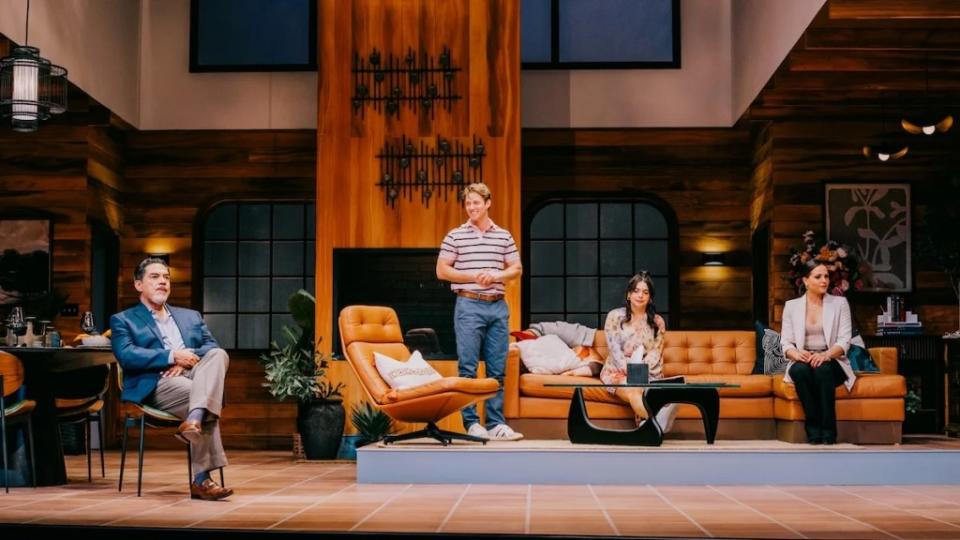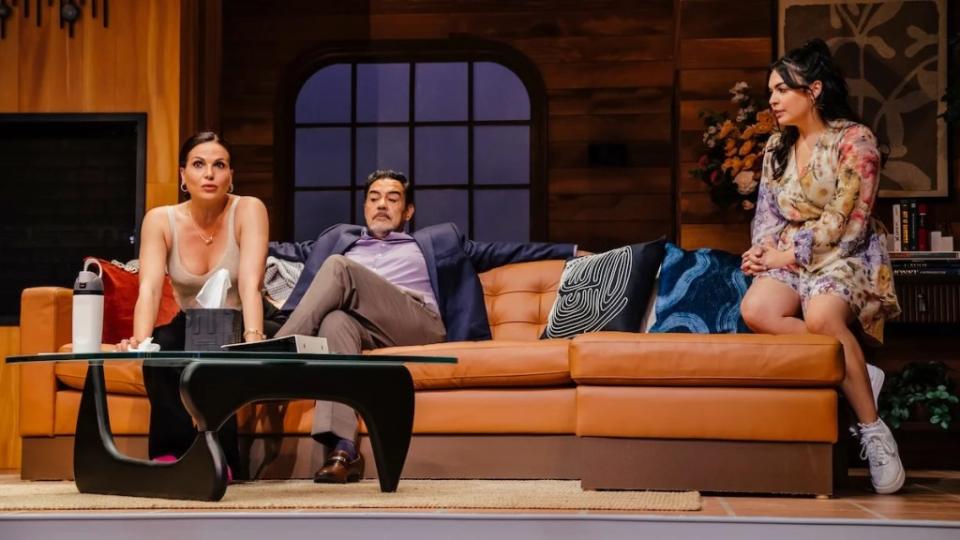From TV to Stage: ‘One Day at a Time’ Cocreator Gloria Calderón Kellett Blazes Trails Again With Groundbreaking Play
- Oops!Something went wrong.Please try again later.
- Oops!Something went wrong.Please try again later.
- Oops!Something went wrong.Please try again later.
- Oops!Something went wrong.Please try again later.
Gloria Calderón Kellett won’t stop blazing trails for Latine representation in entertainment. By cocreating the beloved Netflix comedy series “One Day at a Time” and Prime Video’s “With Love,” the actress and scribe made a name for herself bringing compelling television centered around the Latine community to mainstream audiences. While operating in a stingier Hollywood, she’s found new — and some old — ways to bring those stories to the world.
With her latest project, an original stage production titled “One of the Good Ones,” Calderón Kellett crafted one of those stories for the Los Angeles theater scene — a hilarious and thought-provoking real-time debate about immigration, identity and American history between the members of a Latine American family while hosting their daughter’s boyfriend for dinner. The play, which runs through April 7, marks the first Latine commission in the Pasadena Playhouse’s 100-year history.
“I hope that I’m so relentless that they keep this door open,” Calderón Kellett told TheWrap while reflecting on her historic production, and the strides she’s made as a showrunner, creator and executive producer in Hollywood. “I feel like I really do have a responsibility, because I have been able to break through, so that it’s easier for the next generation.”
Calderón Kellett said “kismet” turned the idea for “One of the Good Ones” into a reality. The monthslong Hollywood double strikes last year gave her the time to get back to her roots as a playwright — she has an MA in Theatre from Goldsmith College, University of London — and conjure this family drama, which Playhouse producing artistic director Danny Feldman streamlined because of the “deep need” to appeal to newer audiences in a city that is almost 50% Latine.
The show also provided jobs for Latine talent on stage and behind the scenes. The cast includes “Once Upon a Time” and “Lincoln Lawyer” actress Lana Parrilla, “One Day at a Time” alum Isabella Gomez, Broadway legend Carlos Gomez, “American Horror Stories” actor Nico Greetham and character actor Santino Jimenez. Producing and opening the play this month felt like a huge win for Calderón Kellett — at a time when inclusive storytelling took a hit as Hollywood produces fewer shows.
“[The last few years were] an exciting moment where all of this art was being made side by side about very different Latine experiences,” Calderón Kellett said, looking back at shows like Starz’s “Vida” and Netflix’s “Gentefied” and “Mr. Iglesias.” “Now all those shows have been decimated, so it feels like a big step backwards again … Thank God for ‘Lopez vs. Lopez.’”
But Calderón Kellett — who said she’s currently working on 11 screen projects at various stages of development — isn’t letting Hollywood backtrack for much longer. Below in her conversation with TheWrap, the writer reflects on the message at the center of “One of the Good Ones,” being a Hollywood creative after the strikes and more.

How did theater become the right medium for this particular story?
Since “One Day at a Time,” I’ve been talking about identity a lot in the press and in writers rooms … Over the last few years [of] having these conversations in different spaces, and seeing how there’s still so much that people don’t know about the Latine community, who we are and how many people are under this umbrella … All that was boiling around in my head.
It felt like the fun way to do [this project] was to take something that was somewhat familiar, like a “Guess Who’s Coming to Dinner,” and flip it to have a lot of conversation about identity in a way that comedy does the best. Norman [Lear] and I really had that in common. We found that comedy was the best way to talk about these things and have these messages … It’s about exploring all of those complexities and putting them in this show in a way that made it funny, showing a conversation being had by a bunch of people who really love and care about each other. And hopefully that leads to conversation after the play ends.
A line from the play that really stuck with me came when Enrique (Gomez) admitted his fear that Latine culture could disappear in the U.S. He drew a comparison to the assimilation of the Irish generations before us. Is that your way of highlighting a flaw in the American experiment?
Definitely. I am married to a lovely white guy who is Irish, English and Polish, but who is disconnected from his ancestry because that’s what they had to do to survive. He loves the Cuban rituals and traditions that we do [at home]. I’ve seen it happen to Italians, as well. There’s [a pressure] to get away from all that stuff and become “Americanized,” which means not celebrating any of [our ancestry].
I think we’re a young country, so we’re learning that maybe the “melting pot” is the wrong thing to be doing.

“One of the Good Ones” made history as the first Latine commission at the Pasadena Playhouse. Before that, your shows were key to a new wave of representation on mainstream television. How does it feel to build these pathways for generations of artists to come?
It feels so long overdue. When “One Day At a Time” first came out, I had been on other dominant culture shows for 15 years and lived a very happy, lovely life. “One Day At a Time” was so personal, and it was a really scary thing to put out there … To see how it was so welcome — so many Latinos felt represented, so many queer kids felt represented and veterans and people with mental health issues. We were talking about so many things on that show. It was so incredible. And then at the same time, “Vida” was happening, “Gentefied” and “Mr. Iglesias” and it felt like such an exciting moment where all of this art is being made side by side about very different Latine experiences. Now all of those shows have been decimated and it feels like a big step backwards again … It’s concerning to me because I got to sit through what felt like this real movement that just ended up being a moment.
So it’s about how do we make these moments into movements? How do we continue to be able to take up space and tell stories of what is nearly 20% of this population?
How can we help keep Latine stories in Hollywood and beyond?
First thing I tell people is just to please talk about it, talk about it, talk about it. I think there is a collective exhaustion that we’re experiencing [with so many new shows and streamers]. We don’t have to feel the weight of our entire community and talk about every single project that’s happening at every single time. But I think that if people are really feeling moved by something, and they want to talk about it in that moment, then talk about it and watch it and share it and celebrate it.
The internet can be a dumpster fire, but it could also be a place of tremendous warmth, unity and community. There’s a lot of great Latine stuff happening all over the country — new restaurants being opened, new books being published, you know, designers, painters, teachers — let’s highlight all of those stories. I think that if we really focus on collective celebration, it doesn’t feel like homework … I don’t know if the hating is getting us much, so let’s focus on some big, revolutionary love.
How are you feeling as a creative in Hollywood during this time?
I’m really privileged. I have already made enough of a name for myself where I can still sell stuff … I understand the weight of that and I carry that with me in a very deep way. I know that I’m going to be OK, so I want to make sure that more of us are OK. I think that there’s going to be a deep contraction, which we’re already seeing and feeling, and it’s going to be slow to return to whatever the new normal will be. I don’t think any of us know what that is yet. But I feel great, I have a lot of stuff in development. I have a lot of projects that I’m working on that I’m very excited about. The future is, I think, very promising — and I hope that’s the case for many other creators, as well.
Did creating “One of the Good Ones” give you any perspective changes in terms of approaching your work in Hollywood?
I just think I’d like to do more. I’m really in a space of wanting to make a lot of great stuff with a lot of great people. I’d love to turn this into a movie one day, and I’d love to write another play next year. I’d love to have us in all spaces, so certainly being a part of the American theater now, and having this eventually be something that companies can put on in different places is absolutely thrilling to me. I’m focused on putting more out into the world and hoping it makes it a gentler and kinder place for all of us.
“One of the Good Ones” runs through April 7 at the Pasadena Playhouse.
This conversation has been edited for clarity and length.
The post From TV to Stage: ‘One Day at a Time’ Cocreator Gloria Calderón Kellett Blazes Trails Again With Groundbreaking Play appeared first on TheWrap.

